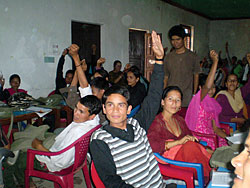 SABHYATA TIMSINA |
It was December 2008 and the SLC exams were right around the corner. The students at Koshi Higher Secondary School in Sunsari, however, had only covered 25 per cent of the syllabus.
They were massively unlucky. After their coursebooks arrived three months late, floods swamped the school. As a result, only a handful of the 110 students were expected to pass.
In short, they needed help.
The parent-teacher association at Rato Bangala got busy straight away, initiating a project called 'Prayas'. A group of A-level students from the Kathmandu school were sent to Sunsari to prepare the students there for the upcoming SLC send-up exams. But with only 17 days at hand, the plan seemed absurd.
One month later came the news that that seventy per cent of the students had passed the examinations. For students who had hardly attended school that year or even flipped through a coursebook prior to the 'Prayas' project, it was a miracle.
Volunteers like Saugat Ghimire were so thrilled by the results, they immediately set their sights on other impoverished parts of the country. "I literally went up to the principal's office one morning and said, 'Miss, let's go to Dailekh,'" says Saugat.
Just like that, the 'Youth to Youth to Child' project was born, with the aim of training young people in Dailekh to teach children in schools across the district. When I first heard about it, I knew I wanted in. For three weeks, we studied education philosophy and child-centred learning in Kathmandu. We then set off to train 1800-odd youth participants in Dailekh.
Every morning we wrote up a lesson plan for the day before heading to the training centres at 10AM. It was arduous work, since we had to plan enough activities - math and vocab activities, or shared reading and book-based activities - to keep our trainees occupied until classes ended at 4PM. But it was engrossing work. Although many of us were away from home for the first time, calls home were rare and rushed.
It did take time to settle into our roles however, and we never really got used to being called 'Miss' or 'Sir'. Indeed, we ran the sessions like a typical classroom, hoping to give the youth-in-training a model to replicate back home. For instance, we were constantly reminding them to raise their hands before they addressed us or the rest of the class.
After work, we would meet up for tea at the bajar and share our experiences, complaining about how difficult it was to stay on our toes all day. But for all our griping, we would eagerly begin making lesson plans for the next day.
Our key message to our traineeswas that they needn't come to Kathmandu for the good life; they were talented enough to create such a life right where they were, in Dailekh. Volunteer Bibhusha Dangol put it best: "If we can go all the way to Dailekh to help, why can't they stay right where they are and do good things?"
In that sense, the experience taught us all something, trainees and teachers alike. You don't need a PhD to change Nepal. All you need is initiative and a little bit of patience.


